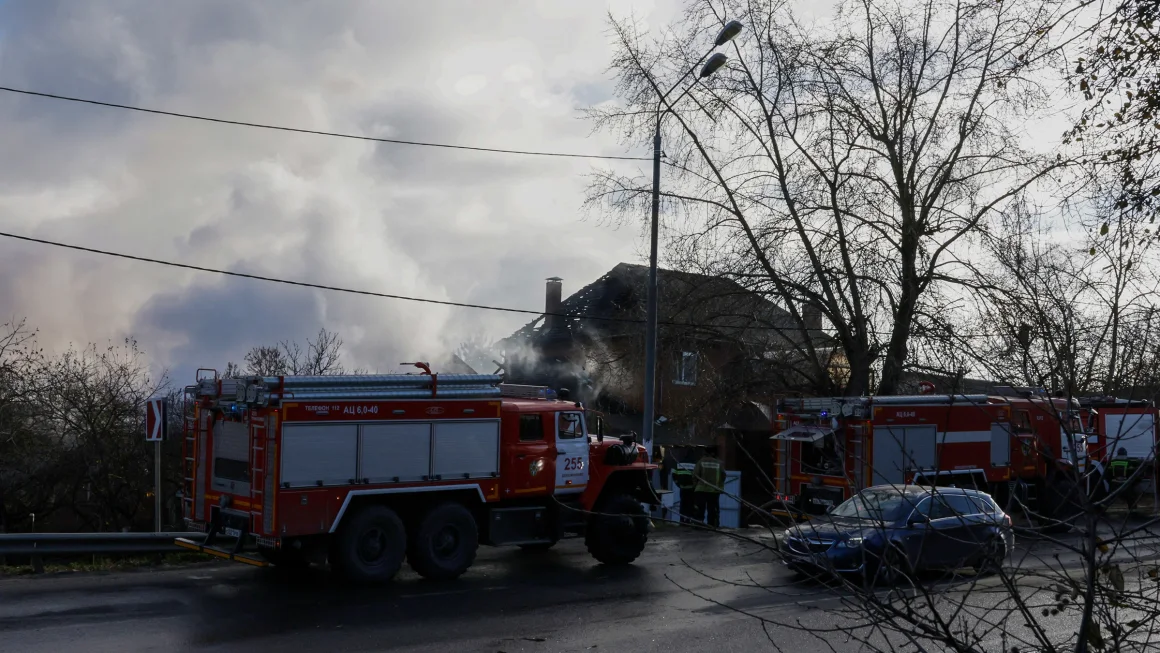November 10, 2024
Overnight, Russia and Ukraine launched record-breaking drone attacks on each other, even as the Kremlin voiced cautious optimism regarding U.S. President-elect Donald Trump’s commitment to strike a deal that could end the nearly three-year conflict. Trump’s unexpected return to the White House has raised questions over the future of Washington’s extensive military and financial aid to Ukraine, critical to Kyiv’s defense.
On the campaign trail, Trump asserted he could end the war within hours and suggested he would negotiate directly with Russian President Vladimir Putin, a stark departure from President Joe Biden’s approach. While his inauguration is set for January, both sides in the conflict show no signs of letting up. Ukrainian President Volodymyr Zelensky reported that Russia launched 145 drones in a single night, the largest attack of its kind so far.
“Last night, Russia launched a record 145 Shaheds and other strike drones against Ukraine,” Zelensky said on social media, urging Western allies to increase support for Ukraine’s defense.
Russia, in turn, claimed it had intercepted 34 Ukrainian drones in an unprecedented attack on Moscow, prompting a temporary shutdown of three airports and setting two homes ablaze in the village of Stanovoye. Moscow’s regional governor, Andrei Vorobyov, called the strike “massive.”
Kremlin Sees “Positive Signals” from Trump’s Campaign Rhetoric
Despite outwardly endorsing Kamala Harris during the U.S. election, many believe that Moscow actually favored Trump, noting his skepticism toward American aid to Ukraine and his focus on deal-making. Kremlin spokesman Dmitry Peskov pointed to what he called “positive signals” from Trump, referencing Trump’s inclination toward peace rather than confrontation.
“Trump talked about how he perceives everything through deals, that he can make a deal that can lead to peace,” Peskov said in an interview with Russian state media. “At least he’s talking about peace, and not about confrontation,” he added, contrasting Trump’s rhetoric with Biden’s focus on achieving a strategic defeat for Russia.
However, Peskov acknowledged Trump’s unpredictability, cautioning that only time would reveal whether his return to office might change the course of the Ukraine conflict. “It’s hard to say what will happen next,” Peskov said. “Trump is less predictable than Harris and Biden.”
While Trump has not yet detailed any terms for a proposed peace deal, Putin has previously demanded that Ukraine cede control of territories in its east and south as a precondition for negotiations. Zelensky, meanwhile, has firmly opposed any concessions, warning that any capitulation to Russian demands would only embolden Moscow and lead to further aggression.
“Massive” Drone Attacks as Russia Gains Ground
Talk of potential U.S.-led peace negotiations comes as Russia advances on the battlefield. According to data from the Washington-based Institute for the Study of War, Moscow’s troops made their largest territorial gains in October since early 2022. On Sunday, Russia’s Defense Ministry claimed another village in eastern Ukraine, marking its ongoing push for territorial control.
Russia’s drone attack on Ukraine follows a series of intensified strikes in recent weeks, with Kyiv appealing to Western allies for additional support. Ukraine’s own retaliatory drone strike on Moscow led to a temporary closure of airports and inflicted damage on the outskirts of the Russian capital, which is rarely targeted in comparison to Kyiv.
During the Russian drone barrage, 70 Ukrainian drones were reportedly intercepted across six regions, including 34 over Moscow, while others were downed over Bryansk, Orlov, Kaluga, Tula, and Kursk. The incident marks one of the largest attacks on Moscow to date, as the conflict continues to escalate.
As Trump’s inauguration approaches, the future of U.S. support for Ukraine hangs in the balance. While Trump’s approach could introduce a new path for peace, any potential negotiations will face significant challenges, especially given Russia’s territorial demands and Ukraine’s insistence on maintaining its sovereignty. Until then, both nations appear determined to continue their fight, raising questions about the potential impact of Trump’s return on the geopolitical landscape.
Sources:
- Associated Press. (2024). “Russia and Ukraine escalate drone attacks amid Trump’s signals of peace deal.”
- AFP. (2024). “Kremlin sees positive signals from Trump after election win.”
- Institute for the Study of War. (2024). “October territorial gains by Russian forces in Ukraine.”

